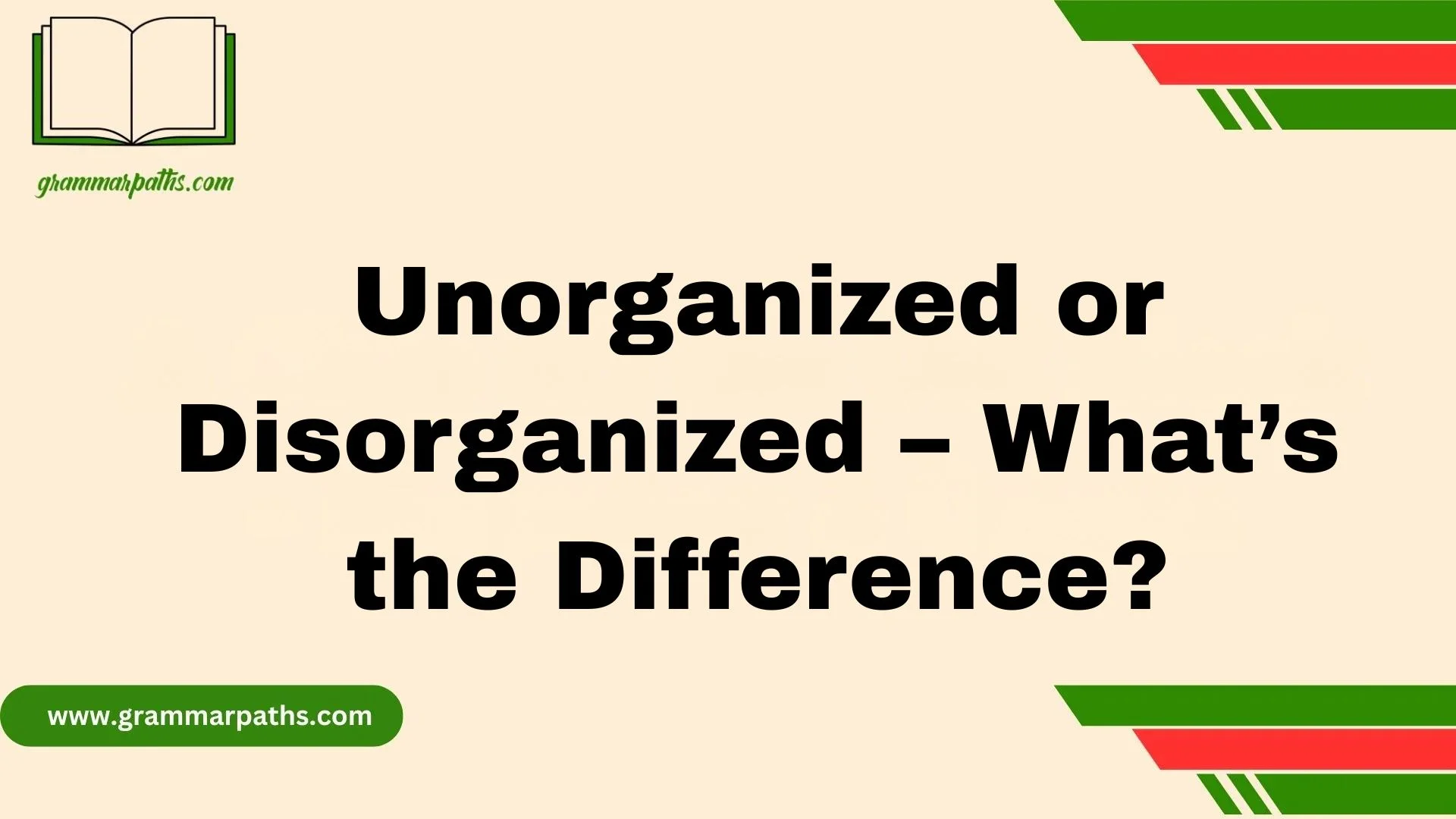Many times, we hear the terms disorganized and unorganized used as if they mean the same thing, but there’s a subtle twist. In my experience working in editing and team management, I’ve seen how one messy desk may be called disorganized—especially if there was once a filing system that fell apart—while another may simply be unorganized, with no categories, folders, or attempt to maintain any order at all. That’s the scoop on Unorganized or Disorganized – What’s the Difference?—a question that hits just right when you’re dealing with workflow or space clarity.
The distinction lies in their usage and context. Disorganized tends to imply a fall from previous neatness, becoming chaotic or messy, while unorganized suggests a total lack of prior structure. Think of it this way: a disorganized room used to be in place, but now things are scattered; an unorganized one never even tried. Understanding these terms can sharpen your vocabulary, help you use the right word, and offer precision in communication—especially in English, where such adjectives often cause confusion.
Why Does This Confusion Between Unorganized and Disorganized Exist?
People often think these words mean the same thing because they both describe a lack of order. However, unorganized and disorganized carry distinct shades of meaning, and mixing them up can subtly change your message.
For example, if you tell your boss your files are “unorganized,” it suggests they were never put together in the first place. Saying they’re “disorganized” implies they once were orderly but have become messy.
This difference matters, especially if you want to sound precise and thoughtful. Whether you’re a student, professional, or casual communicator, getting these words right helps you come across as clear and credible.
Understanding the Prefixes: What Do “Un-” and “Dis-” Mean?
Before digging into the words, let’s examine the two prefixes un- and dis-. These small word parts can completely flip the meaning of a base word.
| Prefix | Meaning | Example Words | Explanation |
| Un- | Not, lack of, opposite of | Unhappy, Unclear, Unorganized | Implies something was never in the state described. |
| Dis- | Opposite of, reversal, removal | Disconnect, Dislike, Disorganized | Implies something was once in the state but changed. |
How This Applies to Our Words
- Unorganized: Something that was never organized or structured.
- Disorganized: Something that was organized but has fallen into disorder.
Understanding this prefix distinction clears up a lot of confusion about the words’ meanings.
A Quick Etymology: Tracing Unorganized and Disorganized Through History
Both unorganized and disorganized stem from the root word organized, which comes from the Latin organum, meaning “tool” or “instrument.” Over time, “organized” evolved in English to mean arranged or systematized.
- The prefix un- originates from Old English un- meaning “not.”
- The prefix dis- has Latin roots dis- meaning “apart” or “away.”
Disorganized appeared in English usage around the mid-1600s, often describing systems or groups that fell into disorder.
Unorganized appeared later, generally referring to things or groups without any initial order or structure.
American English has retained this subtle difference, although casual speech sometimes blurs the lines.
The Key Difference Between Unorganized and Disorganized
Understanding the distinction comes down to whether something was ever organized to begin with.
| Aspect | Unorganized | Disorganized |
| Definition | Not arranged or structured at all | Was arranged but now in disorder |
| Implication | Never had order or system | Order existed but was lost |
| Connotation | Neutral | Slightly negative or critical |
| Examples | A group formed spontaneously without rules | A messy desk where papers got shuffled |
| Common Usage Contexts | Describing things or groups lacking form from start | Describing chaos after disruption |
What This Means For You
Use unorganized when talking about something that lacks any initial plan or arrangement.
Use disorganized when referring to something that was ordered but has become chaotic or inefficient.
Modern Usage of Unorganized vs Disorganized in American English
Both words show up in everyday American English but in different contexts. Here are some common places you might encounter them:
Unorganized Usage Examples
- Social groups or events: “The protest was unorganized, with no clear leadership.”
- Ideas or plans: “His thoughts are unorganized; he needs to make an outline.”
- Physical things: “The closet was unorganized — items were just thrown in.”
Disorganized Usage Examples
- Workspaces: “Her desk is disorganized after the move.”
- Schedules or systems: “The company’s disorganized filing system causes delays.”
- Behaviors: “He’s so disorganized, he always forgets appointments.”
Real-World Examples From Media and Social Media
| Source Type | Example Phrase |
| News Headline | “Disorganized emergency response frustrates residents” |
| Twitter Post | “Feeling unorganized today, so much to do!” |
| Workplace Memo | “Please avoid disorganized reporting; clarity is key.” |
Grammar and Style Guidelines: What Editors Say
Style guides help keep writing clean and consistent. Here’s what some major ones advise:
- AP Stylebook: Uses “disorganized” as the preferred adjective to describe disorder, with “unorganized” less common and generally used to describe something not set up initially.
- Chicago Manual of Style: Recognizes both but stresses context—“disorganized” for lost order, “unorganized” for lacking any order.
Common Grammar Mistakes
- Using “unorganized” to describe something that used to be orderly (e.g., “The files are unorganized” when they were once arranged).
- Confusing the two in formal writing can reduce clarity.
Quick “Do and Don’t” List
| Do | Don’t |
| Use disorganized for lost order | Say “unorganized” when you mean chaos after order |
| Use unorganized for no initial order | Mix them up in formal documents |
| Remember the prefixes’ meanings | Assume they’re interchangeable |
Sentence Examples: Unorganized vs Disorganized In Action
Seeing these words in sentences helps cement their meanings.
| Unorganized Sentences | Disorganized Sentences |
| “The unorganized group met without an agenda.” | “The disorganized group lost the agenda after the meeting.” |
| “She has an unorganized approach to brainstorming ideas.” | “His disorganized notes made it hard to study.” |
| “The warehouse is unorganized; items are just piled up.” | “The warehouse became disorganized after the shipment.” |
Practical Tips to Avoid Mixing Them Up
Keep these handy tricks in mind:
- Mnemonic: “Un means ‘never organized.’ Dis means ‘disrupted organization.’”
- Ask yourself: Was it ever organized? If no, use unorganized. If yes, use disorganized.
- Explain it: Teaching someone else helps cement the difference in your own mind. Try explaining it to a friend or colleague.
- Use context clues — if you see hints about past order, lean towards disorganized.
Summary and Quick Reference Chart
If you remember just one thing, remember this:
Unorganized = never organized. Disorganized = was organized but became messy.
| Word | Meaning | When to Use | Example |
| Unorganized | Lacking any order from the start | Describing things/groups with no system | “The unorganized files were hard to find.” |
| Disorganized | Previously ordered but now chaotic | Describing lost order or messy state | “The disorganized files slowed the project.” |
Conclusion
In short, the difference between unorganized and disorganized lies in their context and history of order. Something disorganized was once neat but became messy or chaotic, while something unorganized has never been structured or arranged. Knowing this nuance helps you pick the right word, improving your English vocabulary and ensuring clearer communication.
FAQs
Can “unorganized” and “disorganized” be used interchangeably?
Not always. While both describe a lack of organization, disorganized implies a loss of order, whereas unorganized means order was never established.
Which word should I use for a messy desk?
If the desk was once organized but later fell apart, it’s disorganized. If it was never sorted or had no filing system, it’s unorganized.
Is this distinction important in everyday English?
Yes. Choosing the right word avoids confusion and adds precision to your communication, especially in formal writing or work settings.
Does context change the meaning?
Absolutely. The context—whether there was a past organization or none at all—is the key factor that sets these words apart.

Mia Rose is the passionate writer and founder of GrammarPaths.com, a resource dedicated to helping learners master English grammar, idioms, and writing skills with ease. With a deep love for language and years of experience in teaching and content creation, Mia simplifies complex grammar rules into clear, practical guides that readers can instantly apply.












